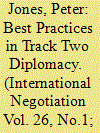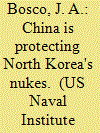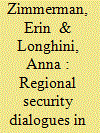| Srl | Item |
| 1 |
ID:
176501


|
|
|
|
|
| Summary/Abstract |
While “Track Two Diplomacy” has been intensively researched since its founding some 60 years ago, much remains to be done to explore important gaps in our understanding of these dialogues. Track Two presents unusual research problems, given its operational and often confidential nature. The contributions to this special issue of International Negotiation tackle some of the key issues confronting the field in an effort to present where we stand in terms of best practices and where further thought and research is required.
|
|
|
|
|
|
|
|
|
|
|
|
|
|
|
|
| 2 |
ID:
123973


|
|
|
|
|
| Publication |
2012.
|
| Summary/Abstract |
Rear Admiral Erick A McValdon, US Navy, (Retired), senior advisor and director emeritus for Asia-Pacific Studies, Institute for Foreign Policy Analysis-IFPA- Mr. Bosco and I are obviously not going to agree on whether China wants North Korea to have nuclear weapons. We do, nonetheless, both want Beijing to play an effective role in getting Pyongyang to relinquish its nuclear weapon programs. Many of us are conscientiously pursuing that including via a series of senior level Track 1.5 (government, thing tank, etc.) workshops organized by the US Institute for Foreign Policy Analysis over almost a decade.
|
|
|
|
|
|
|
|
|
|
|
|
|
|
|
|
| 3 |
ID:
181133


|
|
|
|
|
| Summary/Abstract |
The term regional security dialogue brings to mind state-organised conferences and events; however, an under-appreciated subset of such dialogues are organised by non-state actors that have unique formal aspects. These quasi-formal dialogues operate alongside, and sometimes in competition to, state-sanctioned processes. Why do some of these forums appear to be more effective at fostering regional dialogue than strictly formal or informal processes with the same goals? Drawing from heterogenous discourse approaches, we address this question by identifying and expanding the concept of the quality of discursive space, as a key feature for the success of security dialogues. We then apply this concept to two of the most successful so-called Track 1.5 security dialogues: the Munich Security Conference (MSC) in Europe and the Shangri-La Dialogue (SLD) in Asia. We analyse these cases using a mix of interviews with participants and organisers, participant observation, and public outputs with the aim of improving the understanding of the role and impact of Track 1.5 diplomacy in the practice of international security. Our findings highlight that it is what we call the quality of discursive space, as a mix of different components in this space, which differentiates effective dialogues from mere policy ‘talk shops’.
|
|
|
|
|
|
|
|
|
|
|
|
|
|
|
|